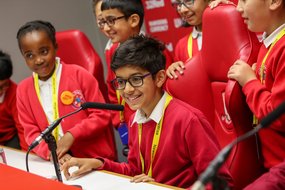
About NewsWise
NewsWise, run by The Guardian Foundation, is an award-winning news-literacy programme aimed at children aged 7 to 11.
In Birmingham, the NewsWise programme aimed to increase teachers’ skills and confidence when teaching critical media and news literacy and to support children in Years 5 and 6 (aged 9 to 11) and their families to:
- Better understand and navigate news, including increasing their ability to identify mis- and disinformation
- Develop their interest in news, including experiencing the news together
- Feel confident to speak up for themselves and others.
Participating schools received pre-project teacher training, workshops, virtual visits from local journalist volunteers, a cross-curricular news-literacy unit of work and a family workshop.
Running over two years between March 2022 and March 2024, the project reached 17 schools serving areas of disadvantage, working with 1,503 children, 42 teachers and 436 family members over this time.
About the evaluation
The National Literacy Trust conducted an external evaluation of the NewsWise project in Birmingham. To evaluate impact, children and teachers were asked to complete pre- and post-project training, workshop and project surveys and families were invited to complete post-workshop feedback forms. The surveys received 1,256 responses from children and 32 responses from teachers. 197 feedback forms were received from family members. Findings suggest that the intervention was successful in terms of reaching its objectives:
Children were better able to identify mis- and disinformation
More children were able to identify news items correctly as ‘real’ or ‘fake’ in short pre- and post-project quizzes:
- 1 in 3 (33.4%) identified 2 of 3 news items correctly as either ‘real’ or ‘fake’ before taking part in NewsWise. This increased to nearly 1 in 2 (45.8%) after taking part, representing a 37% increase.
Children’s news literacy behaviours and confidence improved
- 4 in 5 (80.1%) pupils said that they stopped, thought and checked facts before deciding whether to believe a news story.
- 4 in 5 (82.8%) agreed that they now felt more confident about spotting fake news.
Children’s interest in news increased
- While 1 in 2 (49.5%) children said they were ‘very’ or ‘quite’ interested in news before taking part, this increased to 4 in 5 (80.7%) after the NewsWise workshop. This was sustained over the course of the project, with 79.8% saying they were interested in news at the post-project survey point.
Children felt more confident about advocating for themselves and others through writing their own news reports
- After the NewsWise workshop, 2 in 3 (63.8%) children said they felt more confident to report a news story.
Families reported greater confidence in supporting their children’s news literacy
- 3 in 5 (62.1%) parents felt ‘very’ or ‘quite’ confident about helping their child spot fake news before the NewsWise family workshop, but this increased to almost all (97.9%) after taking part.
- Following the workshop, almost all parents agreed they knew more about how to check if news online could be trusted (97.3%).